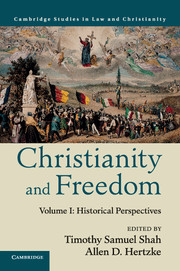Book contents
- Frontmatter
- The Religious Freedom Research Project
- Contents
- Contributing Authors
- Acknowledgments
- Introduction: Christianity and Freedom: Ancient Roots and Historical Innovations
- 1 The Roots of Religious Freedom in Early Christian Thought
- 2 The Christian Roots of Religious Freedom
- 3 Lactantius on Religious Liberty and His Influence on Constantine
- 4 Augustine and Religious Freedom
- 5 Christianity and the Roots of Human Dignity in Late Antiquity
- 6 Liberty of Conscience and Freedom of Religion in the Medieval Canonists and Theologians
- 7 Faith, Liberty, and the Defense of the Poor: Bishop Las Casas in the History of Human Rights
- 8 Calvinist Contributions to Freedom in Early Modern Europe
- 9 Constitutional Protection of the Freedom of Conscience in Colonial America: The Rhode Island and Pennsylvania Experiments
- 10 Christianity and Freedom in the American Founding
- 11 Vibrant Christian Pluralism and the Evolution and Defense of Religious Liberty in America
- 12 Orthodox Christian Contributions to Freedom: Historical Foundations, Contemporary Problematics
- 13 Christianity: A Straggler on the Road to Liberty?
- 14 Protestant Missionaries and the Centrality of Conversion Attempts for the Spread of Education, Printing, Colonial Reform, and Political Democracy
- 15 God and Freedom: Biblical Roots of the Western Idea of Liberty
- Index
15 - God and Freedom: Biblical Roots of the Western Idea of Liberty
Published online by Cambridge University Press: 05 May 2016
- Frontmatter
- The Religious Freedom Research Project
- Contents
- Contributing Authors
- Acknowledgments
- Introduction: Christianity and Freedom: Ancient Roots and Historical Innovations
- 1 The Roots of Religious Freedom in Early Christian Thought
- 2 The Christian Roots of Religious Freedom
- 3 Lactantius on Religious Liberty and His Influence on Constantine
- 4 Augustine and Religious Freedom
- 5 Christianity and the Roots of Human Dignity in Late Antiquity
- 6 Liberty of Conscience and Freedom of Religion in the Medieval Canonists and Theologians
- 7 Faith, Liberty, and the Defense of the Poor: Bishop Las Casas in the History of Human Rights
- 8 Calvinist Contributions to Freedom in Early Modern Europe
- 9 Constitutional Protection of the Freedom of Conscience in Colonial America: The Rhode Island and Pennsylvania Experiments
- 10 Christianity and Freedom in the American Founding
- 11 Vibrant Christian Pluralism and the Evolution and Defense of Religious Liberty in America
- 12 Orthodox Christian Contributions to Freedom: Historical Foundations, Contemporary Problematics
- 13 Christianity: A Straggler on the Road to Liberty?
- 14 Protestant Missionaries and the Centrality of Conversion Attempts for the Spread of Education, Printing, Colonial Reform, and Political Democracy
- 15 God and Freedom: Biblical Roots of the Western Idea of Liberty
- Index
Summary
TWO ASSUMPTIONS
In order to shed some light on the ideas that are at the center of the present meeting, Christianity and Freedom, I will take my bearings from two basic assumptions.
The first is that liberty is not a merely political fact. It strikes its roots in a deeper soil, in the very conception of man and of God that underlies a religion, and even in the way each religion conceives of the interplay of God and man in history. The concrete achievements of people who happened to share the tenets of this or that religion are the business of the historian. However, people who considered themselves as Jews or Christians, whether as individuals or communities, may not have been faithful to the claims and obligations of their faith. In such cases, the historian will have to borrow the standards that they failed to live up to from a field of inquiry other than mere historical narration. Hence, it is not enough for us to tell the story of the achievements and shortcomings of Jews and Christians in giving liberty a concrete dimension through their social institutions. We also have to climb upward to the level of principles, which are theological in nature.
My second assumption is that the idea of liberty was not a sudden invention, springing into existence, out of the blue, as part of the great intellectual revolution that we know as the Enlightenment. Although the Whig conception of history interprets the call for liberty as some kind of break with Christian ideas and ideals that allegedly held sway over the Middle Ages, this view is far from the truth. Western liberty is a far older tradition, the sources of which are to be looked for first and foremost in the medieval period. Lord Acton, in the essays in which he summarized the history of liberty (and that he most regrettably never completed), already could point this out. More was done after him by students of the medieval legal tradition and of the conflict between the papacy and the empire, in which both sides, interestingly, chose as their catchword libertas, that is, “freedom.”
- Type
- Chapter
- Information
- Christianity and Freedom , pp. 391 - 402Publisher: Cambridge University PressPrint publication year: 2016
- 1
- Cited by

